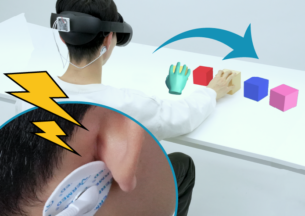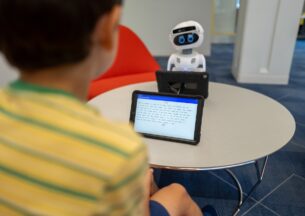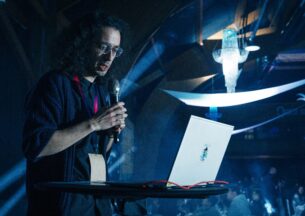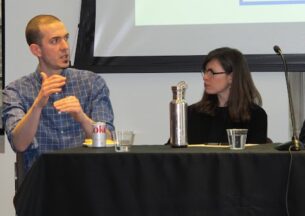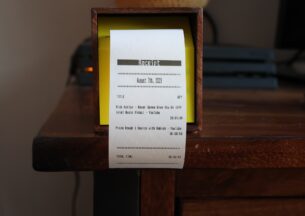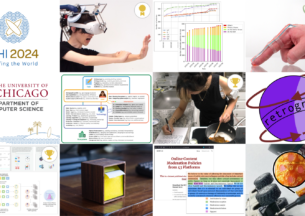New Asst. Prof. Sanjay Krishnan Brings “Intelligent Learning Systems” to Robotics, Databases
Even in today’s automated world, many of the computer systems we encounter are handmade at heart. The systems beneath everything from internet and phone applications to high-end surgical robots were mostly assembled piecemeal over years or decades,with programmers adding layer after layer to software as they address specific issues.
Sanjay Krishnan, who joined UChicago CS this summer as an assistant professor, wants to take that clumsy and slow process out of the hands of humans, instead making the machines themselves responsible for self-improvement. By designing “intelligent learning systems,” that automatically adapt and optimize to new data and tasks, Krishnan hopes to create more flexible and powerful systems that enable visions of a more autonomous world.
“A lot of people are looking at systems to support AI and scale up machine learning, but I look at the reverse problem,” Krishnan said. “I apply AI in the actual systems themselves, so rather than writing these heuristics by hand, you have simple systems that learn strategies through experimentation, try things out in the real world, and synthesize their own strategies to improve their future performance.”
Krishnan came to this research area through an interest in robotics and control theory as an undergraduate studying electrical engineering. After a year working at a data analysis startup, he started graduate school in computer science at the University of California, Berkeley, working there with Michael Franklin’s AMPLab, its successor RISElab, and the automation-focused AUTOlab. Those affiliations allowed Krishnan to explore the intersection of statistics and programming for how data is cleaned, stored, and interpreted, while keeping a hand in the engineering applications that benefit from those scientific advances.
His work on a seemingly mundane topic — data cleaning — emphasizes the relationship between these two poles. Scientists working with large datasets are often inhibited by messy data, inspiring the common joke that 80 percent of data science is cleaning the data…and the other 20 percent is complaining about cleaning the data. Working with Franklin, Krishnan developed methods where scientists could clean just a small sample of their data, and an intelligent database would do the rest, extrapolating rules about how to treat the rest of the dataset.
“When we talk about data science today, it seems to be much more about the mechanics of data then it is actually about the science,” Krishnan said. “We wanted to make it more about the latter, so that all domain scientists have to do is say what they want at a high level, and not have to think about the underlying system or what's fast or what's slow.”
The same principle of building adaptive, learning systems also applies on a broader scale to some of today’s most-hyped technologies, from self-driving cars to virtual assistants. Krishnan’s research has looked at tech that long ago reached common usage: surgical robotics. But despite the sci-fi concept, many of these devices still use decades-old technology, with surgeons using manual controls instead of augmenting their skills and patient safety through advances in computer vision and AI software.
At UC Berkeley, Krishnan worked with AUTOlab on approaches for training surgical robots to perform complex and delicate tasks themselves (you can watch a 2016 talk on the subject or read about the work at Wired). With more adaptive systems, the devices could not only perform surgeries faster and more accurately, but also learn how to handle network delays and other uncertainties — allowing surgeons to safely perform surgeries remotely. For these and other tasks, Krishnan explores reinforcement learning algorithms, which “reward” the computer system for the desired behavior, guiding it towards optimized performance.
“The nature of this reward function is kind of like the nature of a teacher,” Krishnan said. “If you have a reward function that only tells you if you're successful or not, it's very hard to learn from that. But if you have one that sort of guides you down the right paths, then that's much easier to learn.”
Krishnan’s diverse interests also led him on a detour into the art world via a unique collaboration with seismologists at UC Berkeley. Bloom, an art project with Ken Goldberg of Berkeley and data visualization experts at Google, turned real-time vibration data from tectonic activity sensors in California into colorful artwork that was displayed in the Nevada Museum of Art and covered by outlets such as The Atlantic and Gizmodo.
At UChicago CS, he’ll join Anne Rogers and Borja Sotomayor in teaching the introductory Computer Science with Applications undergraduate course, and hopes to add a seminar on AI reinforcement learning. He’ll also work with the department’s growing data science & database and AI & machine learning research groups.
“There's momentum around data projects right now, there's a critical mass and there's a lot of momentum,” Krishnan said. “I thought that was a really attractive part of coming here.”



